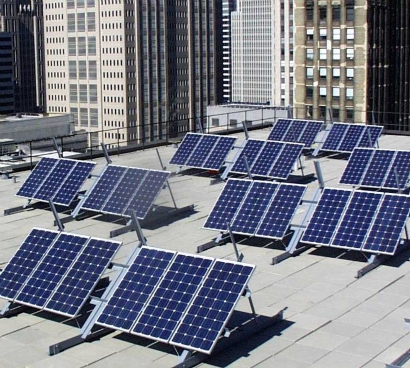
Luckily, solar panel providers increased their sales and profits, despite the effects of the pandemic. Consumer purchases rose last year due to the environmental impact, reduced prices, and technological advancements in renewable energy.
An increase in environmental consciousness has caused consumers to shrink their carbon footprints by installing solar panels. Renewable energy systems produce no air pollution or greenhouse gases while sourcing power. Nonrenewable energy systems generate the majority of global energy, but they cause harsh consequences.
Unlike burning fossil fuels, human interference will not deplete the sun’s energy. When humans source and burn nonrenewable gas and oil, air pollutants invade the atmosphere. These gases trap heat in the air rather than releasing it organically, which increases the global temperature.
As Earth warms the climate changes, causing rippling effects of destruction. To reduce one’s contribution to global degradation, one may limit their reliance on nonrenewable energy sources. Civilians are replacing their incumbent energy sources with solar power in greater numbers than ever.
As solar technology advances and the number of consumers increases, the price of panels drops. The cost of photovoltaic (PV) solar decreased by 82% in the past 11 years. In 2010, the price of energy generation was $0.378 per kilowatt-hour. Today, solar power is $0.068 per kilowatt-hour.
To further reduce a consumer’s expenses, the government provides a federal renewable energy tax break. One can request this financial benefit upon their purchase of a solar energy system. After paying off the panel costs, if your sun exposure is adequate and your energy use is average, your home’s carbon emissions may reach zero.
The current affordability of these systems persuaded many consumers to make panel purchases throughout the pandemic.
Millennials and Generation Z make up the largest present market of consumers. These generations value sustainability and make up a significant portion of real estate customers. When one adds solar panels to their property, the value of the home increases.
A study conducted in California concluded that solar-paneled houses sell for 4% or more above the original market price. Many homeowners installed renewable energy systems on their homes in 2020 to increase the value of their property.
Businesses also utilize renewable energy systems to reduce their environmental impact and increase sales. Because the most extensive customer base values ecological conservation, they are willing to purchase eco-friendly goods over their cheaper counterparts.
Consumers are up to 42% more likely to purchase sustainably sourced goods. To meet this demand, companies installed solar panels to reduce their carbon emissions and ethically produce goods. When shopping, you may see solar energy labels telling customers that companies sustainably crafted the products.
Most consumers believe environmental concerns will continue to grow. To honor this rise in ecological consciousness, businesses will continue to purchase solar panels and engage in other green initiatives.
Renewable energy advancements also increased solar energy system sales in 2020. Scientists recently produced a multi-junction cell panel that converts energy at a 40% efficiency level. This is about double the average efficiency of conventional PV systems.
Innovators also found a new light-absorbing nanoparticle, colloidal quantum dots, which may replace traditional solar cells. The material is less expensive and more flexible, which is better for residential use. Its efficiency levels may surpass current panels by 8% due to its increased solar light absorption.
As solar technology expands, so does customer interest. When consumers purchase solar energy systems, they typically take out a short-term loan. It makes sense that even a global pandemic wouldn’t affect the purchase of cost-saving renewable energy too much.
The current tax credit provided to solar customers will drop 4% by 2030, pushing civilians to make their purchases now. The increase of renewable energy system purchases continues to reduce the air pollutants invading the atmosphere. Although the pandemic was a deeply tragic event, it may ultimately prove beneficial to the long-term conservation of our planet.
Author bio:
Jane Marsh works as an environmental and energy writer. She is also the founder and editor-in-chief of Environment.co.

